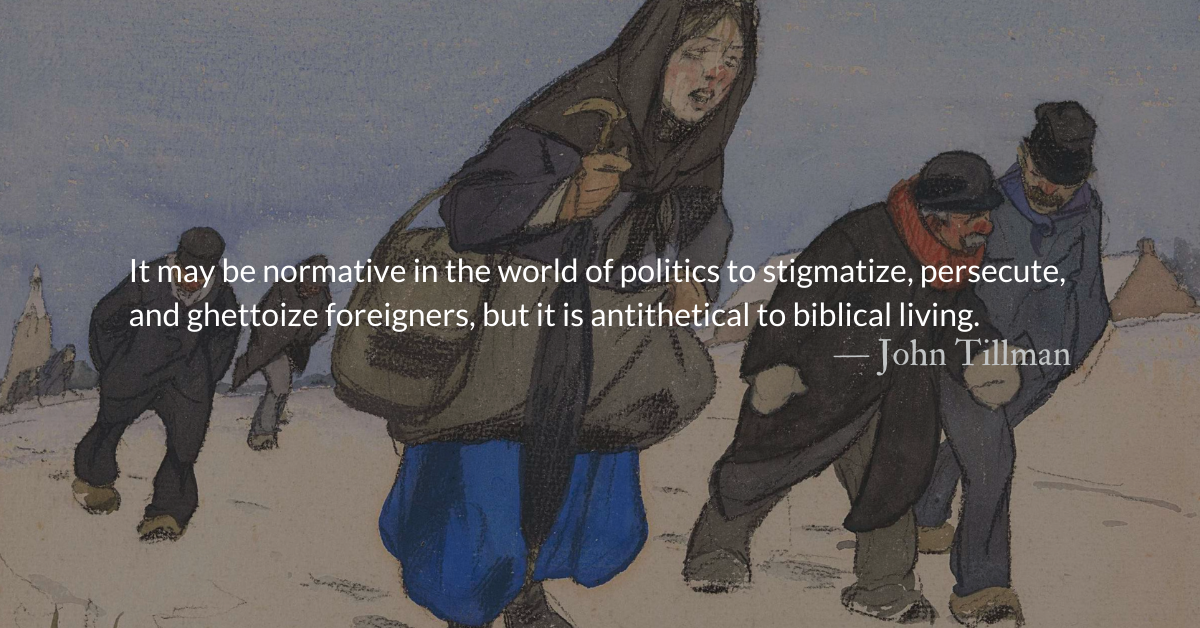Readers’ Choice Month:
This September, The Park Forum is looking back on readers’ selections of our most meaningful and helpful devotionals from the past 12 months. Thank you for your readership. This month is all about hearing from you. Submit a Readers’ Choice post today.
Today’s post was originally published, on March 8, 2022, based on Proverbs 27.8 and Leviticus 19.34.
It was selected by reader, David:
“Amen, Thank you for this reminder of what our call is. We can all pray.”
Scripture Focus: Proverbs 27.8
8 Like a bird that flees its nest
is anyone who flees from home.
Leviticus 19.34
34 The foreigner residing among you must be treated as your native-born. Love them as yourself, for you were foreigners in Egypt. I am the Lord your God.
Image: Today’s image comes from the painting, War Refugees in the Snow by Alfred Ost, painted in 1914.
Reflection: Prayer for Outcasts—Readers’ Choice
By John Tillman
There have been many crises in history that have caused waves of migrants, refugees, and immigrants to flee their homes.
Some of the largest refugee movements in history happened during World War II when from 1939 to 1959 approximately 20 million people fled Europe. Our current decade, however, has nearly matched that 20-year stretch. Approximately 17.8 million refugees have fled Ukraine, Myanmar, Venezuela, Syria, South Sudan, and Libya, since 2011.
Refugee crises will continue to grow as nations and prideful leaders continue to choose violence.
Welcoming the stranger is a consistent command throughout the Bible. One must work hard not to pick up on it, but some do go out of their way to avoid it. It may be normative in the world of politics to stigmatize, persecute, and ghettoize foreigners, but it is antithetical to biblical living.
Welcoming the stranger is counter-cultural, not only today but in its original context. The evil treatment Israel received in Egypt is the experience God holds up as the source of his commands to welcome and treat well strangers and foreigners. “As Egypt was, you must not be. As you were treated, you must never allow others to be treated. Do unto others as you would wish they had done to your ancestors.” (Exodus 22.21; Leviticus 19.33-34; Deuteronomy 10.18-19)
In reflection on the continuation of the Ukrainian war, the widening flow of refugees, and a sobering awareness that this conflict has the potential to encompass other countries, we pause today to pray for migrants, immigrants, and refugees.
Prayer for Outcasts
Lord, we pray, today, for those who flee. Aid their flight.
May they avoid danger, escaping the fowler’s snare.
May they find fair winds, lifting their wings and spirits.
May they settle among the branches of the righteous who are like trees, providing healing for the nations.
We pray for those who are called by God to welcome them.
May our hearts overflow with the love of God for his children
May our eyes see the image of God in each face
May rivers of living water flow from our hearts that will satisfy, not just their physical needs, but their needs for emotional shelter, food, and healing.
When they flee violence, let us show gentleness.
When they flee hatred, let us show love.
When they flee scarcity, let us sate them.
When they flee abuse, let us console them.
When they flee oppression, let us free them.
Music: “God Help the Outcasts” — Hunchback of Notre Dame
Divine Hours Prayer: The Call to Prayer
God has gone up with a shout, the Lord with the sound of the ram’s horn.
Sing praises to God, sing praises; sing praises to our King, sing praises.
For God is King of all the earth; sing praises with all your skill.
God reigns over the nations; God sits upon his holy throne. — Psalm 47.5-8
– From The Divine Hours: Prayers for Summertime by Phyllis Tickle.
Today’s Readings
Lamentations 2 (Listen 4:55)
2 Corinthians 13 (Listen 2:19)
Readers’ Choice is Here!
Your recommended posts from the last 12 months have blessed us! Which one helped you overcome fear?
Read more about Abandon Human Vengeance
The tactics of human vengeance are escalatory. We always hit back harder than we were struck.









